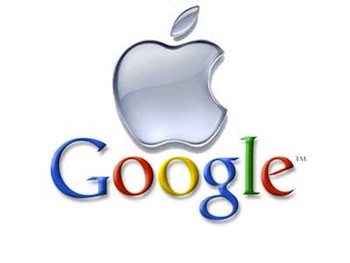 The search engine giant’s latest excursions into mobile phone patents and entertainment gadgets have the tech world abuzz. Could it be that Google wants to be the next Apple? Does Google have the right stuff to topple the Cupertino giant?
The search engine giant’s latest excursions into mobile phone patents and entertainment gadgets have the tech world abuzz. Could it be that Google wants to be the next Apple? Does Google have the right stuff to topple the Cupertino giant?
Google has never shied away from dabbling into diverse endeavors. While Google has yet to enter the realm of hardware manufacture, the company’s prolific software programs and buyouts have slowly infiltrated nearly every aspect of digital communications. Some of Google’s products have elbowed out tech giants once considered invincible. Apple is at the top of its game, currently the most valuable company in the United States. Is it any surprise that Google appears green with Apple envy?
Google, Google, Everywhere
Google is increasingly competing with popular consumer products and services. Chromebook has been compared to the nimble MacBook Air. Google+ is the company’s social networking alternative to Pinterest and Facebook. The acquisitions of the popular blogging platform Blogger and video sharing site YouTube wrap up a healthy portion of the Internet’s media community. After the stellar success of the Apple iPhone, Google dexterously wrought their Android operating system, which has become a fierce competitor in the battle for sophisticated smartphone software. This isn’t enough for the king of the Internet. Now it appears that Google has other venues in mind, venues that appear suspiciously similar to Apple devices.
That’s Entertainment, Google Style
Nicknamed “Project Tungsten,” Google has been developing a new entertainment device that looks, smells and acts like an Apple. Used in tandem with a tablet computer or smartphone, Google’s device will play music files stored on digital devices or online at Google Music. The devices will use the Google Android operating system, of course. Sound familiar?
Google TV
In 2010, Google joined hands with SONY and Logitech to produce Google TV, an interactive web TV device. The device was met with insipid reviews and was criticized for its complex and often convoluted controls and interface. A few months later, Logitech backed out of the deal but the case was clearly made: Google is competing with Apple. Google has not yet given up on web TV and is currently seeking partnerships with LG, Samsung and others to resurrect the device.
Motorola Buyout
Both the European Union and the United States Justice Department have recently approved Google’s $12.5 billion bid for Motorola Mobility, believing the move will not “lessen competition” or “change existing market dynamics” between cell phone companies. Google claims the purchase is to strengthen the Android operating system, but the acquisition of Motorola’s 17,000 patents would certainly shield Google from patent-infringement lawsuits by competing companies, such as Apple.
Still, Google is not a company to sit still for long. Do we really believe that Google will be happy to tinker with Motorola patents and resist the temptation to build a Google-brand smartphone or a Google brand cell company?
No matter how humble the company appears on the surface, we all know that Google loves to be the first and the best. Of course Google wants to be like Apple. Google also wants to be like Facebook and Microsoft.
The million dollar question is this: Can Google produce products on par with Apple products, products that connect with consumers?
Let Me Tell You Why the Answer is No
Much of Google’s production history has been hit and miss, most likely due to Google’s propensity to be the jack of all trades and master of none. Certainly, even Apple has had their bad fruits. Yet Google hasn’t understood the most basic lesson of consumer goods, a lesson that Apple learned early on: you must connect with the consumer.
Consumers do not merely want perfectly engineered gadgets. They want gadgets that improve their life, gadgets that are intuitive and beautiful and feel good. As marvelously engineered as Google products are, there remains an impersonal, automated aura about Google products. Google makes a terrific search engine and a superb Internet browser, but their personal consumer goods tend to lack the intuitiveness and broad aesthetic appeal of Apple products.
What Do You Think?
Of course, Android has been Google’s first real foray into a consumer good that garnered wide consumer appeal. Google realizes this and is attempting to expand their success. Yet Google still needs savvy hardware developers and designers to build the body around the Google engine and a lot of these savvy people work at Apple. As much as consumers appreciate high-powered engines, they overwhelmingly favor a well-designed body. Apple, so far, does both exceptionally well.
Do you think Google is trying to edge out Apple? Do you think Google could succeed?
About the author: Jaime is an avid hiker and skier who loves to write in her spare time for USBundles.com– home of CenturyLink .
Originally posted on March 8, 2012 @ 11:02 am
